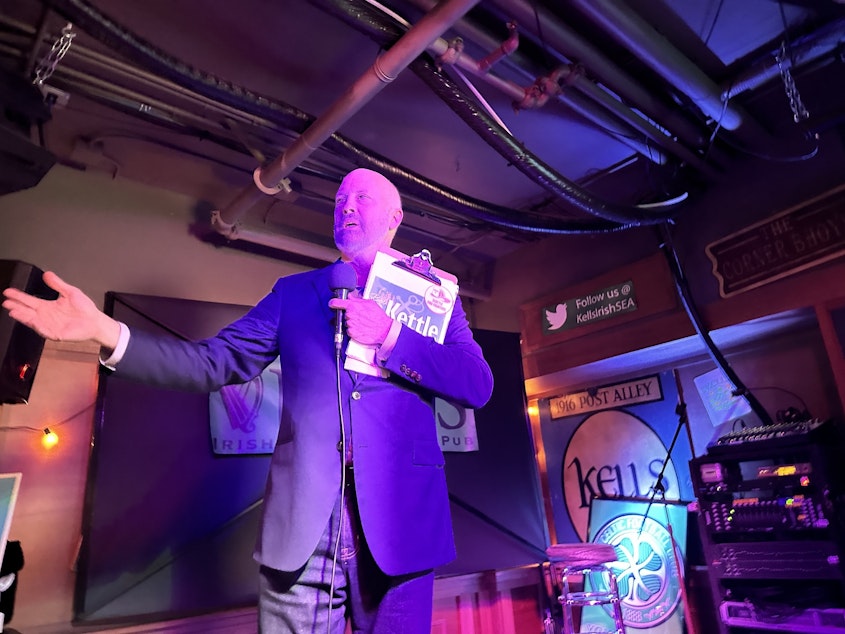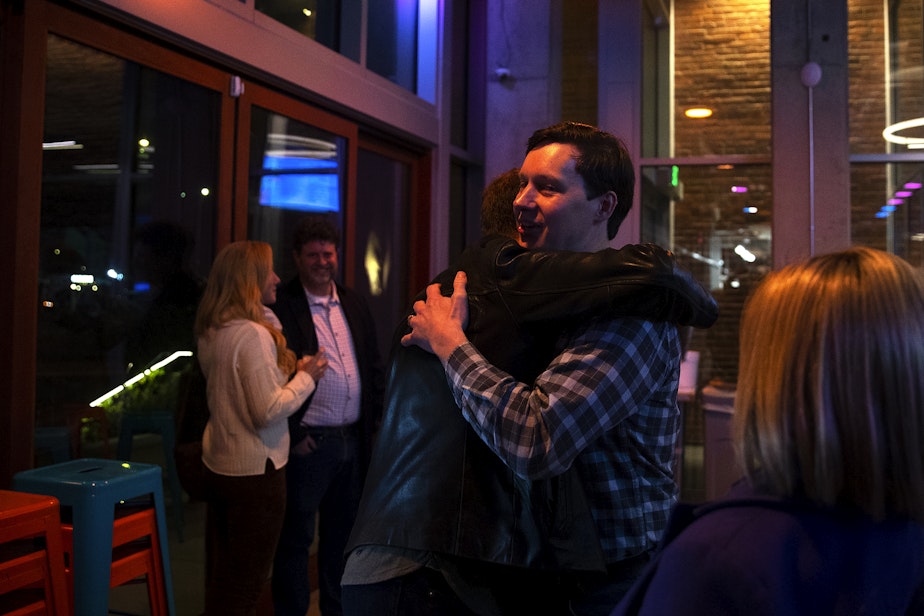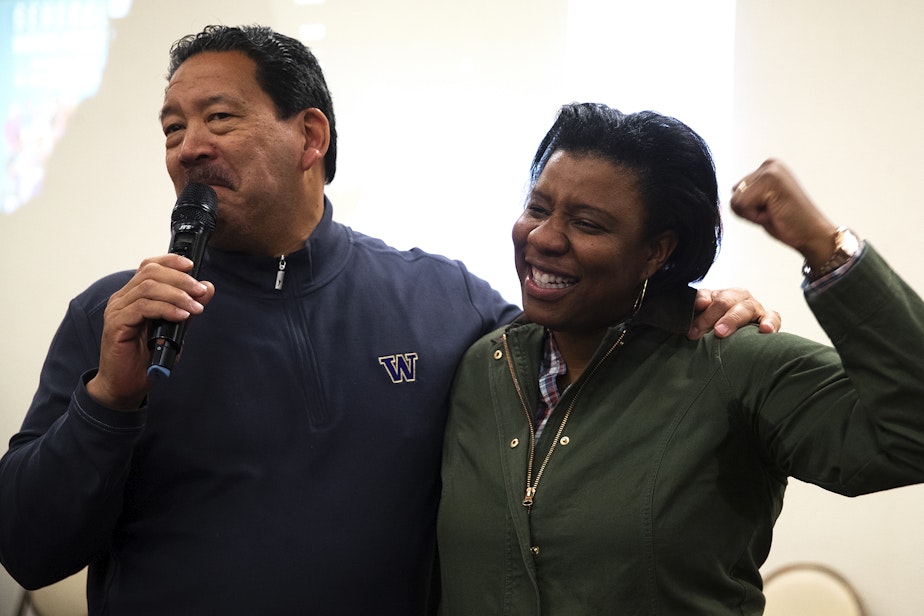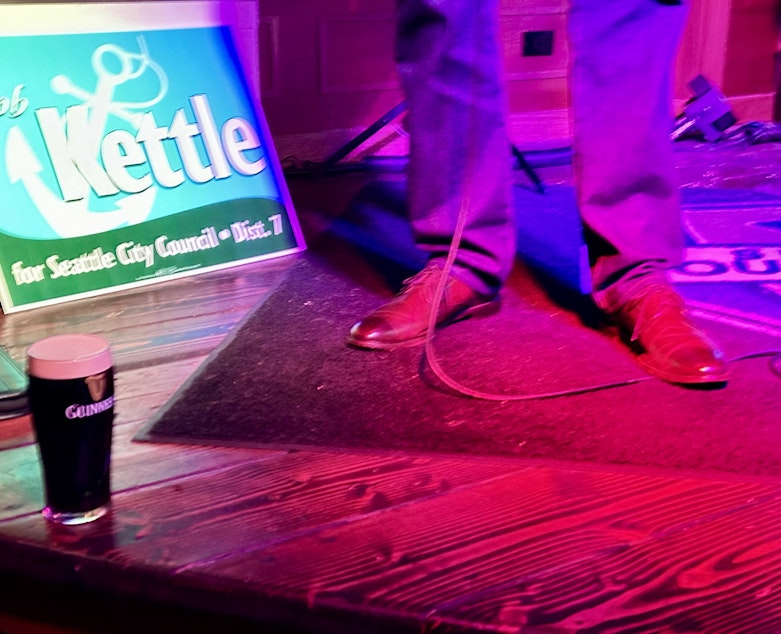Will Seattle become a law-and-order town after this election?

Former Naval officer Bob Kettle had been drinking water all night at Kells Irish Restaurant & Pub in downtown Seattle on election night. When the first results came in, a pint of Guinness awaited him.
Kettle currently has a 12 percentage point lead over the incumbent, progressive Councilmember Andrew Lewis, in the race to represent District 7, which includes downtown.
For months, Kettle and his well-heeled supporters have been slamming Lewis for being too “permissive” on crime.
Lewis countered by pivoting to the center this year, touting his support for law enforcement and saying his earlier support for defunding the police was a mistake.
Kettle’s resume as a former Naval intelligence officer pledging to make the city safe may seem a little off for a deep-blue liberal city like Seattle. But voters have been telling pollsters that crime is one of their top concerns, with homicides nearly at a record high, and sensational stories of shootings, car jackings, and teen muggings making headlines.
Still, this still isn’t Midland, Texas. When your average Seattleite says they’re getting a little freaked out about crime, they often add quickly, almost defensively, that they want the city to do more to address “root causes.” Even the centrist candidates this year, including Bob Kettle, play up their support for “alternatives” to policing.
While it's technically too early to say who will win, with many more ballots to be counted, Lewis lagged far behind his opponent.
Elsewhere in the city on election night, the six other candidates who ran on centrist messages about public safety issues like Kettle were ahead in six races.

Sponsored
In District 3, which includes Capitol Hill and the Central Area, the more moderate candidate Joy Hollingsworth was ahead of progressive Alex Hudson by 17 percent.
“We are going to build Seattle to be our home again," Hollingsworth told supporters, "where our kids are protected. When you’re from the community, you’re accountable to the community.”

Hollingsworth has said that if she wins, she will focus on hiring more cops. Either candidate would replace the council’s furthest left member, Kshama Sawant, in one of the city’s most liberal districts.
In South Seattle’s District 2, which is one of the most progressive in the city, Tanya Woo was ahead by 9 percentage points. Woo is a Chinatown International District activist who made crime the centerpiece of her campaign.
Sponsored
If the council does tilt a bit more law-and-order next year, lower voter turnout could be one factor. In odd-year elections like this one, fewer people vote, particularly younger voters who tend to be more progressive. That shift in the electorate could give a boost to more centrist candidates.
"The lowest turnout tends to be these odd year elections, especially when there are no statewide ballot initiatives," as is the case this year, according to Berkeley political science professor Jake Grumbach, who recently left the University of Washington.
It may help explain what happened in 2021 when voters elected a Republican. City Attorney Ann Davison became the first Republican to win in Seattle since the 1980s, pledging to crack down on lower-level crimes including shoplifting.
If, on the other hand, more progressive views prevail, that will be good news for incumbent Lewis, who has represented District 7 since he was first elected in a progressive wave election in 2019.
Back in 2019, when Lewis was first elected in a progressive wave election, he received generous backing from progressives and the labor union Unite Here. He also received an in-person endorsement from a progressive hero, former Labor Secretary Robert Reich. Lewis was his teaching assistant at University of California, Berkeley.

This year, Lewis alienated some progressives by moving to the center. He recently co-sponsored a law that made drug use and possession prosecutable offenses under city law, for example, despite objections by some progressives that the bill would resurrect the failed war on drugs.
In District 6, which includes Ballard, councilmember Dan Strauss trailed a bit behind Pete Hanning, head of the Fremont Chamber of Commerce, who also ran on public safety. Even more so than Lewis, Strauss pivoted to the center on issues like crime and policing in his campaign.
In West Seattle’s District 1, the progressive candidate Maren Costa, who made crime a big issue, was trailing centrist Rob Saka, who promised to hire more police.
In District 4 in Northeast Seattle, centrist Maritza Rivera is at 55% percent with the more progressive candidate Ron Davis at 44%.
In District 5 in North Seattle, the most centrist candidate Cathy Moore was ahead of progressive ChrisTiana ObeySumner by 40 percentage points.
Back at Kells Pub downtown, Bob Kettle's supporters in the crowd included Republican city attorney Ann Davison, and centrist city Councilmember Sara Nelson, who boldly endorsed Kettle over his opponent, incumbent Andrew Lewis.
Kettle says restoring confidence in public safety is key to economic recovery for downtown and other parts of the city.
“People won't come downtown in terms of activating downtown," he said.
Liz Jones contributed reporting.




